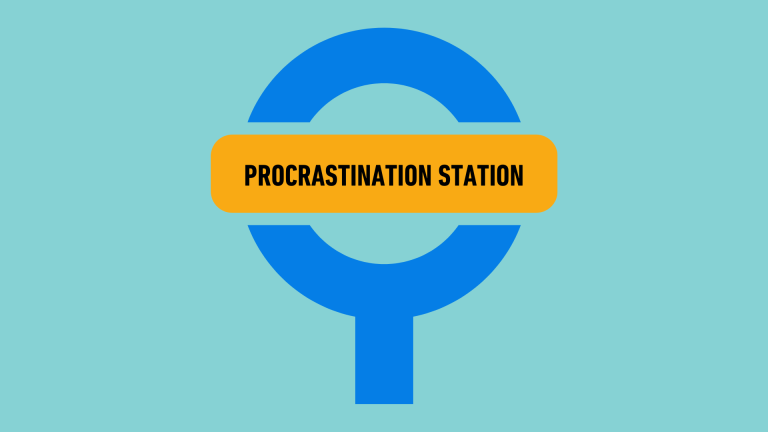Written by Clinical Psychologist, Katie Dobinson
Putting things off when they are difficult is a very human reaction – one many of us are all too familiar with. Procrastination is defined as delaying doing something that needs to be done, because it is unpleasant in some way. It is a normal behaviour to engage in from time-to-time, especially when you’re more exhausted, busy, or unsure about how to approach the task at hand.
We’ve all procrastinated chores that we might not enjoy, like washing the dishes or doing laundry. Every now and then this is fine, but if we constantly put these tasks off, our home would soon become chaotic and eventually, unlivable. Chronic procrastination of things we really do need to do, such as tasks for work or study, raising a difficult issue with a friend, or taking care of our physical health, can impact our mental health, with the potential to contribute to depression and anxiety.
This month we take a deep-dive into some of the different reasons why we get stuck in a cycle of procrastination, and learn how to stop this all-too-common unhelpful pattern.
So, let’s not put it off any longer!
Why do I procrastinate, and what can I do about it?
The reasons why we procrastinate can be different for each individual, but there are some common driving factors. The first step is recognising why you might be putting off that important task, as it will guide you to a likely resolution.

Is my procrastination due to perfectionism?
Setting unrealistic standards for yourself can contribute to high levels of anxiety that over time may become a barrier to commencing an important task. Putting lots of pressure on yourself to write the perfect text message, never make a mistake at work, or be an always-available friend can make it very hard to just take the first step and get started.
The thing about perfection is… it’s impossible to achieve! For anyone! So – try these simple steps to set more realistic expectations that can support you to take the first step towards breaking the procrastination-perfectionism cycle:
- Consider how you can adjust your expectations by challenging unhelpful thoughts. You might think, “I can’t make mistakes. The text message must be perfect, anything less is unacceptable.” Once you identify the thought, challenge it by asking yourself these questions “is that really a fair and true statement?”, “What would I say to a friend in this situation?”, “How helpful is it for me to think this way?”
- Encourage yourself with more balanced thinking e.g., “No one is perfect, and it’s unhelpful for me to expect perfection from myself.”
- Take action by bravely allowing yourself to start the task at hand. You’ll feel much better once you start!

Is my procrastination linked to low motivation?
It’s normal for motivation to fluctuate throughout different periods of your life. However, low motivation is another common factor involved in procrastination.
Motivation is not static, and we can do things to help boost our motivation. You can try these tips if you’re feeling low motivation and stuck in procrastination:
- Try and recognise any external factors that might be reducing your motivation and take steps to manage them if you can (e.g., if you’ve been unwell lately or not sleeping well, perhaps you can seek support from your GP, or consider THIS WAY UP’s online Insomnia Treatment Program.
- Ask yourself some questions to explore and increase your motivation for doing the task that you’ve been avoiding. These could include:
- What are the reasons I want or need to complete this task?
- Is completing this task consistent with my values and what’s important to me?
- Do I need help in understanding how to complete the task, and if so, who can I go to for assistance?
- When will I take the first step towards starting this important task?

Is my procrastination associated with discomfort or boredom?
Often the tasks we procrastinate are ones that, quite frankly, we don’t enjoy! There is always something more fun or interesting we could be doing, but some things just have to get done. If this is the common issue for you, here are some tips for ending the procrastination cycle due to boredom or discomfort that the task brings on:
- Try to get started earlier in the day, rather than putting it off until later. Putting it off will make it harder to start, and there is no time like the present.
- Remind yourself of how you will feel once you can tick this task off the to-do list. Think of the negative emotions drifting away, and the relief you will feel. It’s not far off!
- Use rewards as motivators. Set a reward that you allow yourself to have once you do the task, or part of the task. This might be enjoying a walk outdoors, watching an episode of your new favourite TV show, dinner with a friend, or reading a chapter of your book. Use rewards that are meaningful and enjoyable for you.

Is my procrastination due to a fear of failure?
Low self-esteem and anxiety can contribute to negative thoughts and heavy feelings about our own capabilities. We may not believe we are capable of completing a task, especially when it’s something new, or something we’ve struggled with in the past. This can lead to a cycle of negative self-talk and fear of failure that keeps us stuck at the ‘procrastination station’, convincing ourselves that our attempt will be a failure. Try these tips to overcome procrastination due to fear of failure:
- Reframe ‘success’ and ‘failure’. Perhaps you’re looking at the whole task and expecting yourself to know how to do it all. Can you try breaking it down into smaller tasks, and defining ‘success’ as ticking these off one by one?
- Seek support from others when you need help to get out of the negative thoughts in your head.
- Set a time limit (e.g., 5 to 10 mins) and engage in the task you’ve been procrastinating. You don’t have to complete it, just do it for 5 minutes and notice how you feel after.
- Congratulate and reward yourself every step of the way, no matter how small. Gradually doing a little of the task each day is a huge success!
- Remember that we all make mistakes.
To recap, some of the common reasons we procrastinate can be due to perfectionism, low motivation or fear of failure. If any of these feel familiar, check out our handy resource that gives you further insight into procrastination and some of the helpful ways to address it.
Many people find it hard to take the first step towards getting support for their mental health. Rather than putting it off any longer, take our free online Wellbeing Test now to see which treatment program is a good fit for you.


